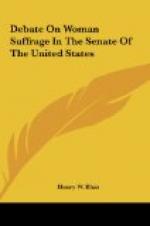of God—not talks of them, as to whether
she may make claim to do them—she carries
a weight from the very sanctity out of which she
steps, as woman, that moves men unlike the moving
of any other power. Shall she resign the chance
of doing really great things, of meeting grand
crises, by making herself common in ward-rooms
and at street-corners, and abolishing the perfect idea
of home by no longer consecrating herself to it?
If individual woman, as has been said, may gain and influence individual man, and so the man-power in affairs—a body of women, purely as such, with cause, and plea, and reason, can always have the ear and attention of bodies of men; but to do this they must come straight from their home sanctities, as representing them—as able to represent them otherwise than men, because of their hearth-priestesshood; not as politicians, bred and hardened in the public arenas.
That the family is the heart
of the state, and that the state
is but the widened family,
is the fact which the old vestal
consecration, power, and honor
set forth and kept in mind.
The voice which has of late been so generally conceded to women in town, decisions as regarding public schools, is an instance of the fittingness of relegating to them certain interests of which they should know more than men, because—applying the key-test with which we have started—it has direct relation to and springs from their motherhood. But can one help suggesting that if the movement had been to place women, merely and directly, upon the committees, by votes of men who saw that this work might be in great part best done by them; if women had asked and offered for the place without the jostle of the town-meeting, or putting in that wedge for the ballot—the thing might have been as readily done, and the objection, or political precedent, avoided.
It is not the real opportunity, when that arises or shows itself in the line of her life-law, that is to be refused for woman. It is the taking from internal power to add to external complication of machinery and to the friction of strife. Let us just touch upon some of the current arguments concerning these external impositions which one set is demanding and the other entreating against.
If voting is to be the chief power in woman’s hands, or even a power of half the moment that is contended for it, it will grow to be the motive and end, the all-absorbing object, with women that it is with men.
The gubernatorial canvass, the presidential year, these will interrupt and clog all home business, suspend decisions, paralyze plans, as they do with men, or else we shall not be much, as thorough politicians, after all. And if we talk of mending all that, of putting politics in their right place, and governing by pure principle instead of party trick, and stumping and electioneering, we go back in effect to the acknowledgment that only in the interior work, and behind politics, can women do better things at all; which, precisely, was to be demonstrated.
Think, simply, of election day for women.




